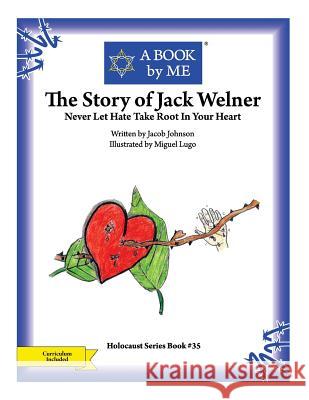The Story of Jack Welner: Never Let Hate Take Root In Your Heart » książka
The Story of Jack Welner: Never Let Hate Take Root In Your Heart
ISBN-13: 9781514298879 / Angielski / Miękka / 2015 / 26 str.
In 1940, nineteen year old Jack Welner's boyhood city was transformed and so was Jack. Nazis took a slum area of Poland's second largest city, Lodz, and surrounded it with barbed wire. They forced 160,000 Jews inside. Jack, his brother Shmulek, sisters Henia, Fela and Hanka, mother, and nephew Sevek, were locked inside the prison-like Lodz Ghetto. Some survived; most did not. Over a hundred people died each day of starvation. Others died from disease. Jack recalls being given leaves from red beets to eat. No beets, just leaves. His mother added salt to the leaves and fried them. They would pretend it tasted like herring. Jack even picked grass when his bread rations were gone. He ate as much fried grass as he could just to stay alive. Nazi's succeeded in dehumanizing the Jews in Lodz Ghetto. Jack knew he must work or be killed. He cut out wooden toys for German children in the lumber mill. Each day he smuggled home sawdust to burn during savagely cold winter months. By August of 1944, Lodz Ghetto closed and as the Jews boarded boxcars, they were handed one piece of bread. Jack ate his immediately. They all believed they were going to Germany to work, because that is what the soldiers told them. Finally, in the middle of the night, the train stopped and doors flew open. They were in Auschwitz concentration camp. The soldiers began screaming at the Jews, separating men from women. As Jack's mother was torn away from him, she shoved her piece of bread into Jack's hand. "You take it. You'll need it." That was the last time Jack saw his mother. He learned later she went to the gas chamber. One week later, Jack and other men were locked in a wagon with standing room only to be taken to an unknown destination. Their horrific four day journey ended at a satellite camp of Dachau. At this camp selections were made. The stronger men were sent to labor camps, the weaker to the crematory. Typhus broke out at camp, and everyone was quarantined to their underground barracks which was hidden from American planes overhead. They couldn't work. They couldn't get any food from their captors. All they had to eat was green, moldy bread and rotten potatoes. The stench was so awful the camp commandant wouldn't go in the barracks. As Britain and American soldiers approached concentration camps from the west, the Soviet soldiers advanced from the east. Hitler ordered camp evacuations, and any evidence of crimes against humanity to be destroyed. On April 25, 1945, thousands of Jews, along with Germans against Hitler, began the infamous death march to nowhere. Thousands of Jews died from starvation, disease, or were simply shot on the long, cold march. On May 2, 1945, their hope was restored when the American army liberated the Nazi's weary captives. After liberation, Jack returned to Poland with hope of finding survivors. He found his younger sister, Fela who was liberated by Russians. Then another miracle He located his youngest sister, Hanka who had been liberated by British soldiers from Bergen-Belsen. They had each other again. Jack immigrated to America on February 21, 1950 and worked as a carpenter in Denver, Colorado. In 1951, Jack married and his wife bore three children. Tragedy struck again when she passed away in 1958. He gathered the children and moved to Israel where both of his sisters lived. They helped Jack for five years and then he returned to Denver where he finished raising his family. Today he has six grandchildren and three great-grandchildren. For Jack's 90th birthday they vacationed in the mountains. Jack stays active by telling his story to students and encouraging them to live life to the fullest.
Zawartość książki może nie spełniać oczekiwań – reklamacje nie obejmują treści, która mogła nie być redakcyjnie ani merytorycznie opracowana.











